|
|
Red-necked Grebe: nesting on the fish ponds near Bachury (Białowieża). About 10 Black-necked Grebes were seen here as well. |
|
|
Bittern: three individuals were hoomping simultaneously near the Barwik tower (Biebrza) during the night we spent there. In Białowieża one bird was heard calling during daytime at the Siemianówka reservoir. |
|
|
Great White Egret: two were seen from the Barwik tower and another one at the Siemianówka lake. |
 |
White Stork: in several hamlets in the Biebrza region Storks are probably outnumbering human inhabitants!
[12-05-03. Pair of Storks on the nest near Wizna, Biebrza]
|
|
|
Black Stork: one bird was seen flying over Osowiec, another flying in a thermal with two adult White-tailed Eagles near Ciszewo (both Biebrza); a third bird flew over Zamość. |
|
|
Whooper Swan: breeding at the Bachury fish ponds. |
|
|
Gadwall: except for a single bird at the Terenowy Ośrodek Edukacyjny ("educational track") near Osowiec, this species was only seen on the Bachury fish ponds. |
|
|
Shoveler: rather uncommon, seen only in small numbers at the end of the Mścichy track (Biebrza) and on the Bachury fish ponds. |
|
|
Garganey: quite common on small ponds and pools. |


|
White-tailed Eagle: we had superb views of adults and immatures at the Bachury fish ponds and Siemianówka lake; more distant adults were seen at Ciszewo and Brzostowo (Biebrza). A group of at least six birds was seen from the Kluki tower (Słowiński), sitting on dune tops and flying around in twos and threes.
[17-05-03. Adult White-tailed Eagle circling over the Bachury fish ponds. Bottom: 17-05-03. Two immatures at the Siemianówka reservoir].
|
 |
Lesser Spotted Eagle: due to rather poor weather conditions only three individuals were seen in the Biebrza area (near Ciszewo). In better weather, birds were seen en route, near Białowieża village and Cisówka (Białowieża).
[10-05-03. Lesser Spotted Eagle in Białowieża]
|
|
|
Hen Harrier: seen from the tower at the Ławki marsh (Biebrza) and near Juszkowy Gród (Białowieża). |
 |
Montague's Harrier: common in suitable habitats, ie. at least five were seen on one day in the southeastern Biebrza basin between Grądy-Woniecko and Zajki.
[14-05-03. 2cy Montague's Harrier at Mścichy, Biebrza]
|
|
|
Honey Buzzard: two birds were seen together over the forest near Koszarówka (near Grajewo, Biebrza); several singles observed in the Białowieża area. |
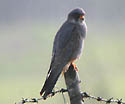 |
Red-footed Falcon: one first summer male perched for a short time near Zajki, Biebrza.
[12-05-03. 2cy male Red-footed Falcon at Zakji]
|
|
|
Hazel Grouse: birds were seen and heard calling along the Olemburska track near the Olszanka Mysliszcze reserve (Białowieża). |
|
|
Corn Crake: very audible in both wet and dry fields. Despite serious efforts we never have been able to actually see one! |
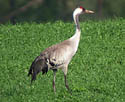 |
Crane: 'klangor Zurawi' (special Polish word for the trumpeting call of Cranes) was heard almost anywhere in the Biebrza and Białowieża areas. Birds were also observed in Słowiński park and even near Warszawa.
[24-05-03. Crane in Słowiński park near Kluki]
|
|
|
Dunlin: about five birds were present at the Bachury fish ponds. |
|
|
Temminck's Stint: several birds were found on the Wisła (Vistula) river banks near Warszawa Błota and at Brzostowo village (Biebrza). |
|
|
Greenish Sandpiper: breeding bird in the Białowieża forest, seen and heard at the Żebra Żubra track. |
|
|
Wood Sandpiper: large numbers on passage in the Biebrza basin. |
|
|
Woodcock: fly-bys at the Barwik tower, in Solska forest and at the Pygmy Owl spot in Białowieża. |
|
|
Great Snipe: at least three males were seen and heard at the famous Barwik location. Also heard in the late afternoon near Mścichy just before a gigantic thunderstorm. |
|
|
Common Snipe: the display of this bird is only slightly less spectacular than that of its larger cousin. Many "bleating" birds were observed in the Biebrza area. |
|
|
Ruff: large numbers were seen along the Biebrza river, including displaying groups of males. |
|
|
Little Gull: about five 2cy birds mingled with the Black-headed Gulls over the Bachury fish ponds. At least 100 birds (most of them 2cy) were present on the sandbar in the Wisła river mouth in Mewia Łacha park. |
 |
Mediterranean Gull: a nesting bird was present in the Black-headed Gull and Common Tern colony in the Wisła at Warszawa Błota, while two more adults were seen at the Łubna rubbish dump.
[30-05-03. Pair of Mediterranean Gulls at the Łubna rubbish dump - thumbnail links to separate Łubna page]
|
|
|
Greater Black-backed Gull: to be expected along the coast (Mewia Łacha reserve), but a 3cy bird at Łubna (central Poland) was a surprise. |
 |
Lesser Black-backed Gull: 2cy and 3cy fuscus birds were present at Łubna, while another 3+cy bird was seen at Mewia Łacha. A good candidate for intermedius was present at Łubna.
[21-05-03. 3cy L f fuscus at Łubna - thumbnail links to separate Łubna page]
|
 |
Herring Gull: common along the coast and present in good numbers at Łubna but apparently much less common in the east.
[21-05-03. Adult L a argentatus at Łubna - thumbnail links to separate Łubna page]
|
 |
Caspian Gull: birds were seen on the Wisła river banks and Siemień fish ponds. The most abundant large gull at Łubna, especially in 2cy.
[21-05-03. 4cy L cachinnans at Łubna - thumbnail links to separate Łubna page]
|
 |
Yellow-legged Gull: quite common at Łubna, especially 2cy birds.
[30-05-03. Adult L michahellis at Łubna - thumbnail links to separate Łubna page]
|
|
|
Little Tern: a few birds were present in the small colony of Common Terns on the Wisła river banks in Warszawa; also seen from the Brzostowo tower and at Mewia Łacha. |
|
|
Caspian Tern: a first summer bird flew past the Brzostowo tower. |
|
|
Black Tern: the most common of the marsh terns, with large numbers in Biebrza area and a colony at the Bachury fish ponds. |
 |
White-winged Black Tern: usualy seen in small numbers except at the end of the Mścichy track. Here a group of 125-150 birds was seen together with at least 40 Black Terns and approximately 20 Whiskered Terns. Also seen at various other locations along the Biebrza river and at the Bachury fish ponds.
[14-05-03. White-winged Black Tern and Whiskered Tern at Mścichy, Biebrza]
|
 |
Whiskered Tern: except for Mścichy also seen in small numbers at Brzostowo village and around Siemianówka lake.
[14-05-03. Whiskered Tern at Mścichy, Biebrza]
|
|
|
Turtle Dove: seems uncommon; only seen at Wizna (Biebrza) and Jałówka (Białowieża). |
|
|
Tawny Owl: heard at every location where we were trying to observe other species of owl. |
|
|
Great Grey Owl: just before our stay a bird had been seen at the Żebra Żubra track and later in the Białowieża strict reserve. During our walk through that reserve, a large grey bird with a dark tail band was glimpsed, flying with slow wing beats at low altitude. Unfortunately it disappeared between the tree stems too quickly for positive identification... |
|
|
Ural Owl: a pair was heard and perfectly seen in the Solska forest. |
|
|
Tengmalm's Owl: a bird was heard in the Suchy reserve in Białowieża. |
|
|
Pygmy Owl: a nest was located by us along the main Hajnówka-Białowieża road between the parking and Białowieża; both male and female had been heard the previous night. |
|
|
Short-eared Owl: seen from the bridge, flying over the Olszanka Mysliszcze reserve (Białowieża). |
|
|
Nightjar: one bird was perched on the road in Solska forest and took off only when it was flushed, another bird was seen flying over at the Pygmy Owl spot in Białowieża. Also heard at the Suchy reserve. |
|
|
Hoopoe: only observed in the Biebrza area at Osowiec, Ciszewo and Grędy. |
 |
Roller: a pair was observed copulating along the dirt track between Jałówka and Romanowo (Białowieża).
[17-05-03. Roller, near Romanowo]
|
|
|
Black Woodpecker: observed daily at several locations in Białowieża. |
 |
Syrian Woodpecker: our search in the Warsawa area was fruitless (only a few pairs occur) but in Zamość we had better luck when a female appeared within 15 minutes.
[16-05-03. Female Syrian Woodpecker in Zamość]
|
|
|
Middle Spotted Woodpecker: common but we only observed a single bird in the strict reserve in Białowieża. |
|
|
White-backed Woodpecker: a male was observed drumming on a tree at the Żebra Żubra track. |
 |
Three-toed Woodpecker: the least common of the larger "black-and-white" woodpeckers in Białowieża. We were lucky to have close views of a fouraging male near the Pygmy Owl spot.
[17-05-03. Male Three-toed Woodpecker, Białowieża]
|
|
|
Wryneck: quite common in the right type of habitat, but more often heard than seen. |
|
|
Red-throated Pipit: a migratory bird passed at the Wisła river near Warsawa Błota on 11-05. |
|
|
Grey Wagtail: one bird flew over our apartment at Sasino Zielonka (Słowiński). |
|
|
Citrine Wagtail: good numbers are supposed to occur along the Mścichy track (Biebrza) but we only saw Yellow Wagtails there. A female was seen on railway track through the Siemianówka lake (Białowieża). |
 |
Thrush Nightingale: common and very audible in various moist areas.
[12-05-03. Thrush Nightingale near Wizna, Biebrza]
|
|
|
Bluebreast: seen and heard along the Barwik, Osowiec and Mścichy tracks. |
 |
Winchat: very common in open areas like Biebrza.
[14-05-03. Male Winchat, Mścichy, Biebrza]
|
|
|
Barred Warbler: a singing adult male was seen along the Narewka river in the Kosy Mostek reserve (Białowieża), whereas a 2cy male was skulking in the Mewia Łacha reserve. |
 |
Aquatic Warbler: three or four singing males were heard and one was seen from the main road east of the Ławki marsh (just south of the tower, Biebrza) and another male showed well along the Mścichy track.
[14-05-03. Aquatic Warbler, Mścichy, Biebrza]
|
|
|
River Warbler: the first birds arrived at the beginning of the trip (10-05 in Białowieża). Possibly due to the gloomy weather none were heard in Biebrza, but plenty were in Białowieża (a particularly good spot is the bridge in the Wysokie Bagno reserve close to the Belorus border) and Słowiński. |
 |
Savi's Warbler: quite common in reedy areas in the Biebrza basin.
[14-05-03. Savi's Warbler, Mścichy, Biebrza]
|
 |
Great Reed Warbler: can be heard wherever there's a patch of reed; much more common than Reed Warbler, except at Łebsko lake near Kluki (Słowiński), where Read Warblers outnumbered their larger cousins.
[14-05-03. Great Reed Warbler, Osowiec, Biebrza]
|
 |
Wood Warbler: very common in most woodlands.
[24-05-03. Wood Warbler, Czołpino, Słowiński]
|
 |
Greenish Warbler: a singing bird was heard in the coastal Beech forest near the lighthouse of Rozewie (near Władysławowo) on 26-05. |
|
|
Firecrest: less common than Goldcrest; two were heard in the Białowieża forest and several in Słowiński. |
|
|
Red-breasted Flycatcher: another species that was returning to the breeding grounds during our stay. The largest number observed was 5-6 birds in the Białowieża strict reserve. |
|
|
Collared Flycatcher: very common in the Białowieża forest, dozens were heard and seen during days with good weather. |
|
|
Long-tailed Tit: every now and then the white-headed caudatus subspecies was seen in Białowieża. |
|
|
Penduline Tit: a male was building a nest at the Osowiec track; also heard at the Siemień fish ponds. |
|
|
Treecreeper: only a single bird was seen in the Białowieża strict reserve. A singing Short-toed Treecreeper was heard in Silo (Słowiński). |
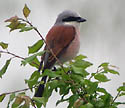 |
Red-backed Shrike: quite common in suitable habitat.
[11-05-03. Male Red-backed Shrike, Suchy Las near Michałowice]
|
 |
Great Grey Shrike: seen near Wizna and Ciszewo. A nest was found along the dirt track between Jałówka and Romanowo, to which the male was carrying at least four large prey items (small lizard, frog, large wasp, and the tail of large lizard) within half an hour.
[11-05-03. Male Great Grey Shrike, near Romanowo, Białowieża]
|
|
|
Nutcracker: fouraging next to the main road near Budy, Biebrza and heard near another settlement called Budy in Białowieża! |
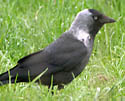 |
Jackdaw: all the birds seen were probably of the monedula subspecies except two in Grądy-Woniecko, which seemed best identified as soemmerringii.
[11-05-03. Jackdaw of the soemmerringii subspecies, Grądy-Woniecko, Biebrza]
|
|
|
Oriole: common in different types of forest. |
|
|
Bullfinch: a singing male was seen in the Wysokie Bagno reserve; also several observed in Słowiński National Park. |
|
|
Hawfinch: common in deciduous forest. |
|
|
Crossbill: heard at the Żebra Żubra track and Wysokie Bagno reserve. |
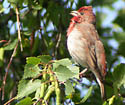 |
Scarlet Rosefinch: together with Greenish Warbler the last species to return; not observed until 22-05 at Warszawa Błota.
[28-05-03. Male Scarlet Rosefinch, Mewia Łacha reserve, Gdańsk]
|
 |
Ortolan Bunting: quite common, especially along the poplar-skirted main road on the east bank of the Biebrza river.
[14-05-03. Male Ortolan Bunting, Brzostowo, Biebrza]
|
 |
Yellowhammer: common everywhere!
[09-05-03. Male Yellowhammer, Otrębusy]
|
 |
Corn Bunting: common but its preferred habitat is scarcely if at all found in the extensively cultivated Biebrza and Białowieża areas; quite common in Słowiński.
[16-05-03. Corn Bunting, near Chełm]
|





























